-
 +3 +1
+3 +1We finally have proof of active volcanoes on Venus
Researchers pored over images from Magellan's visit to Venus in the early 1990s.
-
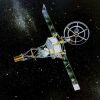 +22 +1
+22 +160 years ago today, a spacecraft zipped past planet Venus for the 1st time ever
Human-built spacecraft have been exploring other planets for a full 60 years. On Dec. 14, 1962, a NASA spacecraft called Mariner 2 flew past Venus in the first-ever planetary flyby. The maneuver gave the spacecraft 42 minutes to observe what scientists now consider Earth's hellish twin — whose hidden surface at the time was thought to be lush, tropical jungle or swamp.
-
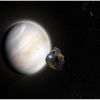 +21 +1
+21 +1Rocket Lab will self-fund a mission to search for life in the clouds of Venus
Never let it be said that Rocket Lab founder Peter Beck lacks a flamboyant streak. Although his Electron launch vehicle is one of the smallest orbital rockets in the world, Beck gleans every bit of performance from the booster he can. On just the rocket's second launch, in January 2018, he added a disco-ball like geodesic sphere called "Humanity Star" to give humans a small and bright shining object to, however briefly, gaze upon in the night sky.
-
 +8 +1
+8 +1What would it take for possible lifeforms to survive on Venus?
Venus may be one of the most inhospitable planets in the universe. But, could any alien lifeform call even this "hell hole" home?
-
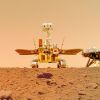 +4 +1
+4 +1China may have its sights set on a mission to Venus
China is considering adding a mission to Venus to its plans for planetary exploration, according to a senior Chinese space official. The country launched its first interplanetary mission, Tianwen 1, to Mars in 2020; the mission's orbiter and Zhurong rover remain at work at the Red Planet. But the mission won't be alone as China plans to go further afield. Wu Weiren, the chief designer of China's lunar exploration program, told Chinese state media earlier this month that Tianwen 2, 3 and 4 missions are set to follow the Mars mission. (Tianwen means "questions about the heavens" and comes from an ancient Chinese poem.)
-
 +21 +1
+21 +1Scientists hail 'the decade of Venus' with 3 new missions on the way
As planetary scientists resumed meeting in person, Venus experts had something special to celebrate. For decades, the Venus community has been crying out for missions: Only one dedicated spacecraft is currently studying our next-door neighbor, and NASA's last robotic Venus visitor ended its mission in 1994. Within just a couple weeks in 2021, however, Venus scientists suddenly had a veritable banquet to look forward to, with NASA and its European counterpart committing to three new missions due to launch in the early 2030s.
-
 +17 +1
+17 +1The Russian Venus Landers
Given the intense temperatures and pressures of Venus, it is indeed impressive that Russian engineers were able to successfully land vehicles there 10 times during the 1970s and 1980s. These were Venera 7 to 14, and Vega 1 and 2 which deployed landers and balloon-born instrument packages.
-
 +23 +1
+23 +150 years ago, Arecibo got an unprecedented view of Venus’ surface
Venus’ perpetually cloud-shrouded surface remains penetrable only by radio waves. A planetary radar group now reports results of an extended series of radar measurements of the topography of Venus that for the first time provides a view of surface height variations around the entire circumference of the planet.
-
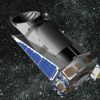 +10 +1
+10 +1New findings a 'complete reversal' in understanding why Earth became hospitable to life and its 'twin' didn't
Venus may be a sweltering wasteland today, but scientists have questioned whether the planet was always so inhospitable. While previous studies suggested Venus might have once been covered in oceans, new research has found the opposite: Venus has likely never been able to support oceans.
-
 +2 +1
+2 +1On Its Way To Mercury, This European Space Probe Just Swung By Venus
The European Space Agency probe BepiColombo is scheduled to go into orbit around Mercury in 2025. But to reach the innermost planet in the solar system, BepiColombo needs a gravity assist from neighboring Venus, so it flew within 350 miles of the planet today at around 9:48 am ET on its way to Mercury.
-
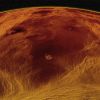 +12 +1
+12 +1Nighttime weather on Venus revealed for the 1st time
What's the weather like at night on Venus? Scientists are finally finding out. Just one planet away, Venus is relatively close to Earth and we have been studying it for a long time, with the first Venusian probe reaching the planet in 1978. However, scientists have known very little about what the weather is like at night on Venus. That is, until now.
-
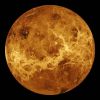 +3 +1
+3 +1No hope for life in Venus clouds, but maybe on Jupiter, study suggests
The amount of water in the atmosphere of Venus is so low that even the most drought-tolerant of Earth's microbes wouldn't be able to survive there, a new study has found. The findings seem to wipe out the hope stirred by last year's discovery of molecules potentially created by living organisms in the scorched planet's atmosphere that were seen as an indication of the possible presence of life.
-
 +15 +1
+15 +1Nasa plans return to Venus with two missions by 2030
Nasa is returning to Venus for the first time in more than three decades to gain a better understanding of the history of what scientists believe could have been the first habitable planet in the solar system. Plans for two separate and ambitious deep space missions to Earth’s nearest neighbour were announced on Wednesday by the head of the US space agency, Bill Nelson. Launches were targeted for a 2028-2030 time frame, he said.
-
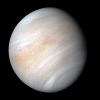 +27 +1
+27 +1Fifteen Years of Radar Reveal Venus’s Most Basic Facts
Planetary scientists agree that a Venusian day is a little longer than 243 Earth days, but for decades their measurements have disagreed about the additional number of minutes and seconds. What’s more, those measurements haven’t been precise enough to infer other fundamental properties of Venus, like how the length of a day changes, the tilt of the planet’s spin relative to its orbital plane, and the precession of that tilt. Without these precise values, a craft attempting to land on Venus might miss its target zone by as much as 30 kilometers.
-
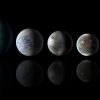 +24 +1
+24 +1Venus Held Onto its Water Surprisingly Well During its History
Named for the ancient goddess of fertility, the planet Venus could not be more hostile to life as we know it. Aside from being the hottest planet in the Solar System, Venus has also an atmosphere that is 92 times denser than Earth’s, and regularly experiences sulfuric acid rain. But as we’ve learned from multiple surveys, Venus was once a much milder climate and even had vast oceans on its surface.
-
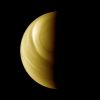 +22 +1
+22 +1Not finding life on Venus would be disappointing. But it’s good science at work
Doubts about the existence of phosphine gas on Venus—a possible sign of biology—are part of the normal course of testing an extraordinary finding.
-
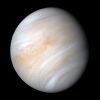 +14 +1
+14 +1We need to go to Venus as soon as possible
Answering questions about the possibility of life there will require not one but several new missions that can directly study the planet.
-
 +15 +1
+15 +1Doubts over a ‘possible sign of life’ on Venus show how science works
Detecting phosphine in Venus’ atmosphere made headlines, but reanalyses and new searches call into question the original discovery of the molecule.
-
 +18 +1
+18 +1Carl Sagan predicted life on Venus in 1967. We may be close to proving him right.
Millions of space nerds reacted with joy Monday to a study showing the atmosphere of Venus contains phosphine, a chemical byproduct of biological life. But none would have been more thrilled or less surprised by the discovery than the late, great Carl Sagan — who said this day might come more than 50 years ago.
-
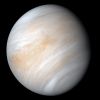 +14 +1
+14 +1Earth life may have traveled to Venus aboard sky-skimming asteroid
If there is indeed life on Venus, it may have come from Earth — aboard an asteroid that scooped up microbes high in our skies.
Submit a link
Start a discussion




















